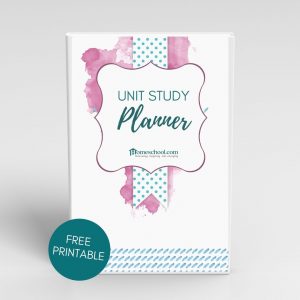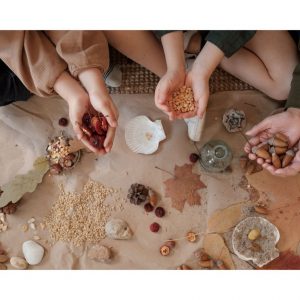Wondering how to teach with a homeschool unit study? We’re here to help answer your questions!
What is a Homeschool Unit Study?
A unit of study focuses on one central theme, e.g. insects. In the unit study, students will learn all about insects by combining multiple subjects into one study. These learning adventures may cover everything from the biology of insects, the history of species, the spelling of scientific names, and more! In other words, one topic is studied through various subjects. Life isn’t categorized into tidy boxes, so unit studies reflect that! What does this mean for your kids? Unit studies are a great way to introduce students to real-life experiences.
There are plenty of ways to incorporate unit studies as homeschoolers. Several homeschooling websites, like ours, have already put together free unit studies on a variety of topics. Still, what happens if you can’t find a unit study for your topic, or studies aren’t available for free? You can create one yourself! Intimidated? There are, in fact, several benefits to creating your own homeschool unit study…
- The DIY unit study can be as in-depth as you like
- You can adjust the study to your student’s level
- Eliminate pressure to move on
- Include/exclude whatever makes you comfortable
- Keep it secular/religious per your preference
How to Plan a Homeschool Unit Study
Planning your own unit study can easy to feel intimidating at first. I’ve been there! My advice: start by just thinking about the topic. Maybe jot down a few things you’d like to cover. Flexibility is the best part of unit studies! Nearly any information about the topic can be a potential resource. Another benefit of unit studies? They’re wonderful for hands-on learning since they easily also include tactile projects and crafts. Pinterest will be your best friend!
Here are 10 steps to get started!
- Choose a unit study theme — What is your topic? Truth be told, a unit study can be about nearly anything! Examples: a book, historical event, upcoming holiday, or anything in-between. Basically, if you can think of it, you can study it. The sky’s the limit!
- Consider your unit study goals — Take a moment to think about your academic goals. What’s your end goal for this study? These goals can be as simple or complex as you like. Do you just want them to understand the themes of a book? Great! Do you want to challenge them to deeply analyze the worldview of a movie? Also great! Either way, you can even customize the goals specifically for each child.

Click to Print and Get Planning! - Search for unit study books — A solid unit study will always involve books! Try a Google search for related books, like “Books for kids about [topic].” Also, check out Goodreads, Pinterest, or Amazon. Of course, don’t forget your library! A library’s database is usually a treasure trove. Better yet, talk with the librarian. It’s kinda their job to know these things. 😉
- Find videos — Videos are excellent teaching tools, especially for visual learners! Some popular video resources: YouTube, National Geographic, Netflix, Hulu, and even Amazon Prime. Again, your local library may also have a few video resources.
- Include arts and crafts — Crafts are pretty much the ultimate hands-on learning experience. For example, your unit study is about Earth Day. Have your kids build a Play-Doh model of the Earth! Again, Pinterest will be your best friend. There are loads of themed crafts and activities for kids on there!
- Plan unit study-related field trips — Outings bring homeschooling alive! Give your students a firsthand experience by scheduling a field trip or outing related to the unit study. Here are a few ideas: observatories, zoos, lakes, the ocean, creeks, fishing, aquariums, science centers, museums, performances, and more.
- Consider science projects — You’d be surprised at how often science can accompany a unit study. Look online for science project ideas. Again, it’s a great chance for hands-on learning.
- List your activities — List out the activities plus any assignments you have in mind. Ask yourself: what do you absolutely want your kids to get done? How about cooking/baking? Perhaps prepare a themed dish from a book or an era!
- Create the schedule — How many days do you want to devote to this study? One week? One month? Of course, the time needed is directly related to your planned activities, books, and projects. Organize and order the activities.
- Add it to your schedule — The last step: incorporating your unit study with your existing weekly plan! Whether you’re planning this study before the school year begins or you’re weaving it into your existing plan, you’ll have the best results if it’s on the books.
10 Homeschool Unit Study Curriculum Resources
As mentioned, unit studies can focus on any subject. An important rule of thumb: follow your children’s excitement. All of us learn best when we’re having fun! A unit study is rooted in the joy of exploration and discovery, wherever that topic may lead.
Whether you want to supplement your homeschool curriculum with occasional free unit studies or you’re planning to teach entirely from back-to-back units using a unit study curriculum, these resources will help as you plan your homeschool unit study.
- Homeschool Unit Study Resources. We have several unit studies listed here, ranging across several topics and categorized by umbrella subjects for convenience. Are you looking for unit studies regarding specific holidays or events? There are several to choose from here. You can either use them how they are now or as a
 starting point for your own!
starting point for your own! - 10 Steps to Creating Your Own Homeschool Unit Study. This is a perfect guide to use to get your feet wet creating your own DIY homeschool unit study!
- How to Improve Writing Skills with Unit Studies. Unit studies are a good opportunity to work on writing skills. Explore how to include writing assignments in a unit study as well as how to keep the units engaging for your kids.
- Make Your Own Space Exploration Unit Study! Is your homeschooler fascinated with space? Or, perhaps it’s time to learn about space science? Either way, these resources will get you started!
- DIY Poetry Unit Study. Does it seem like a stretch to create a poetry unit study? Actually, poetry’s great for unit studies! Kids tend to dislike poetry since it’s complicated and frequently confusing. A poetry study can help your kids learn how to read it and understand it’s a powerful emotion!
- Creating Your Own Literature-Based Unit Study. If you have book lovers at home, a literature study will be highly enjoyed. Literature is excellent for exploring certain topics, especially history!
- Living Book Lists for Homeschool Science Study. As with literature, living books are a great choice for a unit of study. Living books teach through the narrative to keep students engaged and excited. Are living books new to you? Consider this article to learn more.
- Lapbook Study Any Time of the Year! Have you heard of lap books? They’re fantastic for unit studies! Lapbooks are similar to scrapbooks in that they feature collections around a central theme, usually stored in file folders. If you’re looking for a solid, organized method for storing your child’s unit study work, a lap book is a great solution!
- Science Unit Studies + Printables. We have free, comprehensive unit study resources available for astronomy, chemistry, nuclear science, and earth science! Want to bolster your kid’s experience with science? A unit study is a great option!
The unit studies educational method is home education that integrates multiple subjects by thematic units. This philosophy of education utilizes hands-on activities. It’s especially useful if you’re homeschooling multiple grade levels, so students can learn together like a one-room schoolhouse. Visit Time4Learning for more unit study ideas!
FAQ About Unit Studies
- Q: How long should a homeschool unit study be?
- A: A unit study can be as long or as short as you want it to be! Depending upon the age and interest level of your child, a unit study can last a day or two, a week, or even a month! You’ll be surprised how quickly these studies can evolve and continue. If your child keeps coming up with questions, keep the study
 going and find their answers!
going and find their answers!
- A: A unit study can be as long or as short as you want it to be! Depending upon the age and interest level of your child, a unit study can last a day or two, a week, or even a month! You’ll be surprised how quickly these studies can evolve and continue. If your child keeps coming up with questions, keep the study
- Q: What should be included in a unit study?
- A: Once you have your topic of study, find ways to include as many subjects as possible. For example, if you choose to do a unit study on bugs, head to the library and find some books on different types of bugs. What’s the difference between spiders and insects? Venomous vs. non-venomous? How many are in each family? What do they eat? What kind of home do they live in? What do they do? What are some benefits? Have there been notable instances of bugs throughout history? etc. Answering these questions can involve science, social studies, language arts, math skills, and more.
- Q: What is the importance of a unit study?
- A: By using unit studies, you allow your child to take control of their learning and immerse themselves in things that interest them. They allow for unbridled creativity and hands-on learning experiences while letting your child’s inquisitive mind roam free.
- Q: What are the benefits of a unit study?
- A: Unit studies can span different ages and learning styles, include many subjects, focus on your child’s interests, and encourage a love of learning.
Unit Studies Are Integrated Learning
Guest content by Kim Andrysczyk.
Unit studies incorporate the basic subjects into a thematic unit. Any unit can cover reading, writing, math, science, social studies, and fine arts. Lessons are adaptable to different skill levels, various learning styles, and multiple intelligences.
Thematic unit studies start with a primary subject area, such as Literature or History. This primary subject progresses in sequential order from topic to topic. Each chapter ties in other subject areas with practical hands-on activities. The students make meaningful connections between the various subjects.
The daily schedule is streamlined so the parent does not have to juggle separate textbooks for each child. There’s not enough time in the school day to cover everything anyway. Each student can explore the topic at their own ability level.
Spark of Curiosity with Unit Studies
Unit Studies often start with interesting materials or a spark of curiosity. Something that you want to know more about so you will dig deeper into the topic. This method encourages you to chase the rabbit down the trail.
There’s an old joke that goes like this:
Question: How does a homeschooler change a lightbulb?
Answer: First, I check three books on electricity out of the library, then the kids make models of light bulbs, read a biography of Thomas Edison and do a skit based on his life.
Next, we study the history of lighting methods and practice dipping our own candles.
Then, we take a field trip to the store where we compare types of light bulbs as well as prices and figure out how much change we’ll get if we buy a pack of bulbs for $1.99 and pay with a five dollar bill.
On the way home, a discussion develops over the history of money and also Abraham Lincoln, as his picture is on the five dollar bill.
Finally, after building a homemade ladder out of branches dragged from the woods, the light bulb is installed. And there is light.
While this joke may be an exaggeration, the goal is clear. To develop a love of learning that carries you throughout life.
Hands-On Unit Study Activities To Do:
Most unit studies include some practical hands-on activities to include in the course of study. These activities are meant to be engaging and interesting; not boring.
- Lapbook: A lap book is a collection of mini-books, pockets, spinners, and fold-outs in a file folder that fits in the child’s lap. The project is a fun way to review the learning again and again. Usually is more picture based for young learners.
- Notebooking: A collection of maps, copy work, and reports in a 3-ring binder. A similar project to the lapbook, for a fun way to review the learning. Usually includes more writing activities geared toward older learners.

- Timelines and Maps: The topics may not be presented in chronological or geographical order. So, it is beneficial to create personalized markers for connections to time and location.
Unit studies can also be great for getting started with homeschooling. Before you choose a year-long curriculum package, you could start out with some topical studies. Unit Studies are also great for a change of pace to take a break from the routine. During holidays or vacations, you could use it for the short term.
A separate math curriculum is recommended for the unit study approach. Many homeschoolers choose the unit study teaching method as their primary method of education while some use it only for special projects or studies.
Homeschool Unit Studies Curriculum
As homeschooling gains popularity, there are many homeschool unit study curriculum options that are now available. What does this mean? It simplifies homeschooling with a unit study approach. Some of our favorite homeschool unit study curricula include:
- The Gentle + Classical Press
- Gather ‘Round Homeschool
- The Good and the Beautiful
- Rabbit Trails Homeschool
- See our Back to Homeschool Awards for more great unit study curriculum options!
More About the Author
Kim Andrysczyk is a secular homeschool veteran, homeschool group leader, coffee addict, sarcasm expert, and an accidental blogger. She’s the self-appointed busybody of homeschooling in South Carolina, always on the lookout for new connections to people, places, and resources. Find her at The South Carolina Homeschooling Connection and Facebook. View Kim’s contributed articles here! Originally published here.





